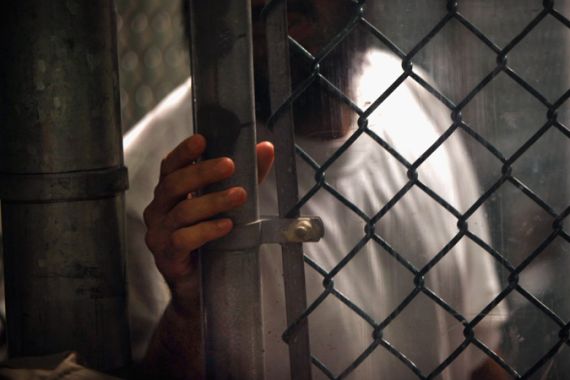Out of Guantanamo, into an Egyptian jail
After 10 years of unjust imprisonment, Adel al-Gazzar returned to his family in Egypt, only to be arrested again.

 |
| Adel al-Gazzar was re-imprisoned in Cairo’s Tora Prison, where a prisoner was allegedly tortured to death [GALLO/GETTY] |
As parliamentary elections begin in Egypt, Reprieve’s Life After Guantanamo team is working against the clock for the luckless Egyptian ex-Guantanamo prisoner Adel al-Gazzar, now re-imprisoned in Cairo. Like that of most Egyptians, Adel’s future hangs in the balance, as does his liberty, and everything depends on whether Egypt is indeed moving towards a civilian-led democracy or whether the events of this past spring were not so much a successful defeat by the people of Mubarak’s regime as a military coup.
In the new Egypt, as with all fledgling democracies, a major battlefield has been in the creation and administration of law. And so far – in sentencing an estimated 12,000 civilians in unfair military trials and sweeping aside months of constitutional debate to enforce its own Provisional Constitution – the Supreme Council of the Armed Forces (SCAF) has not done much for rule of law in Egypt. The fate of Adel al-Gazzar may serve as a further bellwether, both of SCAF’s attitude to rule of law and its illusory break with the Mubarak regime.
Adel is currently awaiting the outcome of his latest legal challenge to arbitrary detention at Tora Prison, where Mubarak’s sons were sent, and where a prisoner was allegedly tortured to death three weeks ago. Like many in Tora, Adel is being held on false, politically-motivated charges. His in absentia sentence was handed down in 2002 as Adel languished in Guantanamo, completely unaware that he was being charged and tried in Cairo.
He had no legal representation and the so-called “evidence” against him consisted of false statements tortured out of his co-defendants. While many of those co-defendants were deemed innocent (after a judicial finding that their statements were fabrications), Adel was not so lucky. As a Guantanamo prisoner, Adel was an easy target for the military court, and with no legal defence, the charges against him stuck.
Adel’s predicament seems even crueller in the light of his disastrous 10-year ordeal. In 2001, shocked by television images of refugees fleeing US airstrikes, Adel travelled to Afghanistan to volunteer with the Red Crescent. After being injured in an airstrike, he was sold from his hospital bed in Pakistan to American security agents for a bounty.
Beginning of a nightmare
Adel was then transferred to a Kandahar prison, where he was tortured – and subjected to medical neglect so severe it resulted in the amputation of his injured leg – before being transferred to Guantánamo.
Realising that they had made a mistake, the US authorities cleared Adel for release almost immediately. But because he was considered a political dissident who could not safely return to Egypt, Adel was placed on the resettlement list and began an eight-year wait for a third country to offer him refuge. Yet even after his transfer to supposed liberty in Slovakia in January 2010, Adel was illegally imprisoned for more than six months and only released after a painful hunger strike.
A few months later, Adel watched along with the rest of the world as revolution broke out in Egypt, and he was finally able to contemplate returning home to his wife and four children. Excited by the prospect of a new, democratic Egypt, Adel never dreamt that his patently unjust in absentia sentence would be upheld by a post-Mubarak court. Sadly, he was wrong. After his initial, joyful arrival home, he was allowed only a brief reunion with his wife and four children, whom he had not seen for a decade, before being arrested.
Worryingly, Adel’s story shows all too clearly the different paths the caretaker governments in Egypt and Tunisia have taken. Under the Ben Ali regime, Tunisian citizens held in Guantanamo were also given in absentia sentences on trumped up, politically-motivated charges. Yet one of the first decrees made by the interim government granted amnesty for political prisoners – including current or ex-Guantanamo detainees.
As a result, a prisoner who had been serving his in absentia sentence in a Tunisian jail since being transferred from Guantanamo in 2007 was immediately released, while two former Guantanamo detainees have safely returned to freedom in Tunisia. The interim government then pledged to send a delegation to the US to negotiate for the release of the remaining Tunisians held in Guantanamo. This stance has received considerable support among political parties and civil society in Tunisia.
If the military prosecutor does not acquit Adel, it will be yet one further indication that, unlike Tunisia, Egypt has not broken with its illegal detention policies. Just last week, SCAF officials went on state television to urge Egyptians to stop comparing SCAF’s rule to the Mubarak regime. Clearly, the solution is for them to stop acting like the Mubarak regime.
Katie Taylor works on Reprieve’s Life after Guantanamo Project, helping to facilitate the resettlement of ex-Guantanamo prisoners in Europe.
The views expressed in this article are the author’s own and do not necessarily reflect Al Jazeera’s editorial policy.
